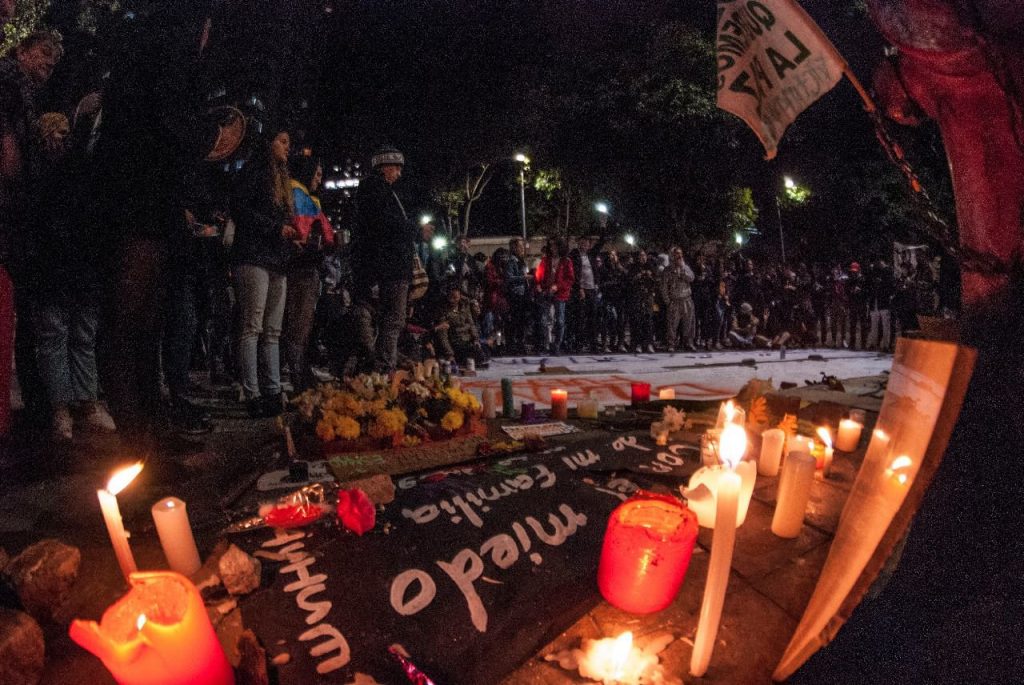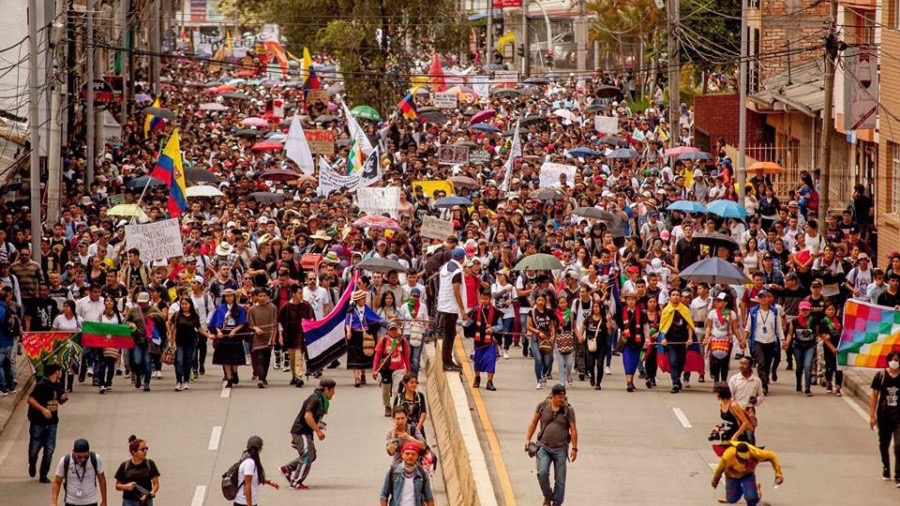The resistance of the Colombian people, against the right-wing government of President Iván Duque and his policies of neoliberalism, war and violence, continues.
On November 27, under the banner of ”Against Duque’s neoliberal package, the Organization for Economic Co-operation and Development (OECD), the International Monetary (IMF) and the World Bank. For Life and Peace,” hundreds of thousands of citizens, students, teachers, workers and members of several feminist, human rights, Indigenous, peasant and social organizations and trade unions, participated in mobilizations across Colombia.
In the capital Bogotá, the multitudes gathered at the National Park and marched to the Plaza de Bolívar to reject the national government’s austerity measures and the heavy police repression of social protests.
Similar large scale demonstrations were held in the cities of Barranquilla, Bucaramanga, Cali and Medellín, among others.
#27NParoNacional | Bucaramanga sigue en paro nacional.#DilanNoMurióADilanLoMataron
Gepostet von Colombia Informa am Mittwoch, 27. November 2019
The mobilizations were carried out as part of a general strike, called for by the National Strike Committee, in the absence of agreement in a dialogue with the government that began a day before, on November 26.
The National Strike Committee is a platform that brings together dozens of trade unions and peoples’ organizations, which have been on strike since November 21 and have been mobilizing throughout the country.
The strike was also called to pay tribute to Dilan Cruz, an 18-year-old student, who succumbed to his injuries this Monday after he was shot by an officer of the Mobile Anti-Disturbances Squadron (ESMAD). The immediate dissolution of the ESMAD is one of the key demands of these protests.
A day before, on November 26, the Committee had called for a national Cacerolazo for Life, in memory of Dilan Cruz and to demand an end to state repression and the criminalization of social protests. Several cacerolazos, a protest in which people bang pots and pans, were also held in all parts of the country, to reject the murder of the young boy and express the popular discontent against the excessive use of force by the ESMAD officials. At night, many candle-lit marches were also carried out to honor the life of the young student.
On November 25, the anti-government mobilizations saw massive participation of women, as the day also marked the International Day for the Elimination of Violence Against Women. Thousands of women mobilized across the country to reject gender based inequality and insecurity as well as to commemorate the women who have been killed and have suffered from gender based violence.
In the capital, Bogotá, at the Plaza Bolivar, a multitude of women, including Indigenous women and members of various feminist, social and human rights organizations, carried out a symbolic act in defense of life and peace and against the policies of war and violence of Duque’s government. Simultaneously, at the National Park, thousands of citizens, workers and members of several social movements and trade unions, peacefully demonstrated against Duque’s neoliberal ‘paquetazo’ or package.
Repression
Throughout the days of struggle and mobilization, ESMAD officials have been attacking protesters with tear gas, stun grenades, water cannons and unconventional weapons. In seven days of anti-government protests, more than 800 people have been detained and around 100 have been severely injured.
The people’s indignation against state terrorism escalated after the night of November 25, when the sad news of the death of Dilan Cruz surfaced. The young boy was shot in the head from point-blank range by ESMAD agents on November 23, during an anti-government mobilization in the capital. He died in the San Ignacio Hospital in Bogotá after spending three days in the ICU.

Another victim of brutal police repression, Duván Villegas, is fighting for his life in the University Hospital in Valle de Cauca department. He is a 27-year-old designer and was shot in the back by a policeman in the city of Cali during curfew on November 21, when he was driving back home on his bike.
In the streets, Dilan and his fighting spirit symbolize all the children and young people killed and wounded by the ESMAD and the Colombian state.
Since its formation in 1999, the ESMAD officials have killed over 21 people in the past 20 years. However, there are no exact figures about the number of incidents of violent aggression carried out by this Squad towards protesters, students, peasants and Indigenous people.
Decree of state financial holding company
Amid the national strike and the social chaos, the government issued a decree that would privatize public companies.
On November 24, the Colombian finance minister, Alberto Carrasquilla, approved the creation of the Bicentennial Group, a state financial holding company, through decree 2111 of 2019. This measure is a part of Duque’s neoliberal ‘package’.
According to national trade unions such as the Central Union of Workers (CUT), the General Confederation of Labor (CGT) and the Confederation of Colombian Workers (CTC), the Bicentennial Group will eliminate the direct control of the State over money from state financial companies and will open doors to privatize at least 16 public companies, leading to the mass dismissal of more than 17,000 workers.
Negotiations with the government
On November 26, the representatives of the National Strike Committee attended a negotiation meeting with President Duque.
In the meeting, the representatives gave president Iván Duque a 13 point charter of demands, which includes the immediate withdrawal of the decree that creates the Financial Holding Company, the immediate dissolution of the ESMAD and purification of National Police, the implementation of effective measures to stop the genocide of social, peasant and Indigenous leaders, the compliance of the peace agreements with the guerrillas of the Revolutionary Armed Forces of Colombia – People’s (FARC-EP) as well as the agreements signed by the government of former President with teachers, peasants, Indigenous and many other trade unions, among others.
In the meeting, President Duque proposed to continue negotiations in an extended meeting, called the Grand National Conversation, which includes other sectors such as businessmen and representatives of state control agencies, the Attorney General’s Office and the Ombudsman’s Office. The committee refused the proposal as it did not include other sectors that are not part of the committee and indicated their intention to maintain a direct dialogue with the president.
After the meeting, the Committee called on the workers to continue the strike and mobilizations that they have been carrying out for the past six days.
The social and political movement, the Congreso de los Pueblos (the People’s Congress), also rejected the President’s call for a dialogue without people’s participation.
“We reject the false call to dialogue made by the national government that actually seeks to legitimize its policy, fragment the struggle and continue to deepen the neoliberal model and state terrorism. Therefore, we join the voices that reject this manipulated dialogue, until there is a clear manifestation of reversing the counter reforms that want to worsen our living conditions, privatize public heritage and drain common goods. Nor can there be a dialogue without the decision to dismantle ESMAD and without determining those responsible for the hundreds of human rights violations,” manifested the People’s Congress in an official statement.
International solidarity
Various social movements and human rights organizations from across Latin American and the world have denounced the extreme police force against peaceful protesters and have expressed their solidarity with the struggle of the Colombian people.
On November 26, in Buenos Aires, Argentina, a large group of Colombians residing in Argentina, along with Argentinian social and political leaders, demonstrated outside the Colombian Consulate. The protesters paid tribute to Dilan Cruz and expressed their solidarity with all the injured and detained people by the fascists government of Iván Duque and former president Álvaro Uribe Vélez.





